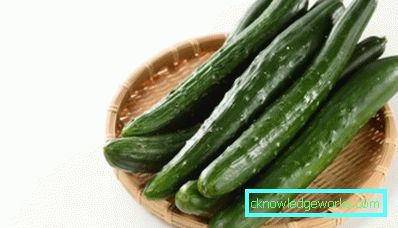Cucumber alligator
Each new season in horticulture begins with the selection of crops and varieties for cultivation in the garden. Cucumbers are often present in the lists of selected crops. Sophisticated gardeners, and even newcomers are looking for new varieties that will not only be of high quality, but will also be surprised with an unusual shape or color, among these it is worth highlighting the Alligator cucumber variety.

Characteristic of Alligator variety cucumbers
Characteristics of a variety
Variety refers to his fast-ripening - ripening occurs in 40-45 days. Differs in high productivity. With 1 sq. M. You can collect about 16 kg of cucumbers. Also note its resistance to various adverse changes in conditions. Suitable for growing in ordinary greenhouses and open beds.
Description of the bush
Nondeterminant variety, vigorous shrubs with a well-developed root system. The quality is good, it can easily curl on a horizontal support. Medium leaves have a pentagonal shape with smooth corners, uniformly green, slightly pubescent. A plant with a female type of flowering, in the interstitial forms up to two fruits.
Description of the fetus
Often, Alligator cucumbers are chosen for planting because of the unique shape of the fruit. Cucumbers of this variety grow up to 45 cm in length, but have a small circumference of weight, on average, 300g and more.
Appearance of fruits:
- elongated cylindrical shape;
- tuberosity is average;
- spikes short in small quantity;
- the pulp is light, uniform;
- seeds are very small elongated.
Cucumbers Alligator f1 have a very high taste, note a clear cucumber taste, juiciness and a bit sweetish taste. Variety of table appointments, used in salads and even desserts.
Care
In order for the plants to develop well, and the fruits were large, crispy and tasty, the correct form, even such an undemanding variety needs care and the right agricultural technology. In the cultivation of cucumbers, it is important not only to choose a variety, but also to plant, water and feed them properly, so that the strong bushes will be pleased with the high yield.
Landing

The plant needs good lighting.
This variety can be grown both seedling and seedlessly. If you grow cucumbers through seedlings, the crop can be obtained 1-2 weeks earlier than those sown directly in the ground.
The bed for cucumbers Alligator f1 should be well prepared.
Cucumbers love loose well-drained soil, fertilized with mineral or organic supplements. The landing place must be well lit and ventilated. When planting bushes need to observe the distance between the bushes 40x50 cm per square. m should be no more than two plants.
Watering
This Chinese hybrid is moisture-loving, and not only its growth, but also the quality of the fruit depends on watering. With insufficient watering cucumbers grow small, irregular shape. The alligator should be watered with warm water, the temperature should not be lower than the temperature of the soil, and preferably 2-3 degrees higher. Watering is carried out in the morning at least once every two to three days. In the period of drought every day. The bushes react well to spraying the sheet with warm water, this increases the humidity of the air and has a positive effect on the plant.
Top dressing
For good development, high yield and long-term fruiting cucumbers Alligator F1 requires foliar feeding several times during the growing season. It will be enough to carry out three such feeding.
In the management of organic farming, ash, chicken manure can be used to replenish nitrogen reserves, and bone meal or herbal extract as a potassium phosphate fertilizer. For any kind of fertilizer, it is important to maintain dosing.
Pests and diseases
In the description of the variety of cucumber, alligator is noted for high resistance to powdery mildew, parasporoz, cucumber mosaic, anthracosis. But to improve resistance for preventive purposes, the bushes can be treated several times with Trichodermine.
"Alligators". The most productive cucumbersCucumber Alligator F1. CELEBRANS - SIBERIAN GARYLAND
But the Alligator f1 variety can be affected by pests:
- nematode;
- spider mite;
- aphid.
Insecticides of a wide range of Aktara, Commodore, Aktelik will help to combat aphids From the spider mite, you will need to carry out 2 treatments with acaricides (Fufanol, Fitovem, Antiklesch). To combat the nematode, you can use nematophagin - an environmentally safe, natural, biological product based on the predatory fungus Arthobotrys oligospora.
Conclusions
The variety is distinguished not only by the unique shape and good taste of the fruit, but it is also not picky about growing conditions and care. Disease resistance is undoubtedly the virtue of a companion. Watering and fertilizing will help get a good harvest.